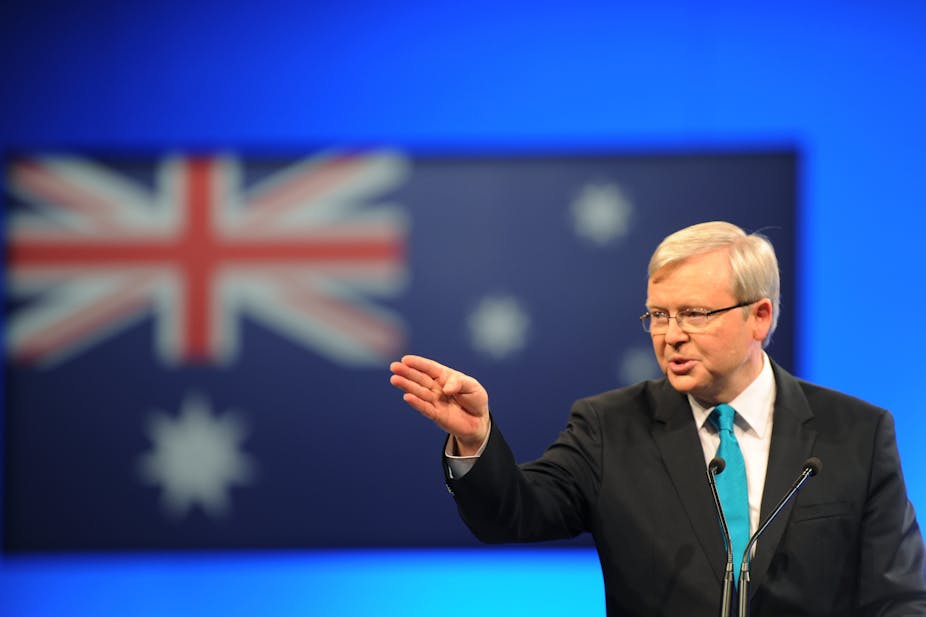The Prime Minister has declared that jobs is the first priority. He will create them while the opposition intends to cut, cut, cut. At his policy launch he said that “Federal Labor is going to this election with a positive plan for jobs”, which included a $10,000 tax cut on equipment purchases for small business, and a $6000 handout to apprentices upon the completion of their training.
There was a time when the idea of a job was related to some piece of work that someone wanted done. A job was not a thing in itself but related to the creation of value within some enterprise.
One therefore didn’t create jobs as such. What one did was create an economic environment in which one of the limits on production was the amount of labour available. The amount of work that people were willing to pay to be done seldom equalled the total number of people who were available, but most of the time they were pretty close. Only in periods recognised as periods of high unemployment was this not the case.
Thus, to create jobs really meant creating an economy in which production was encouraged to the greatest extent, with the demand for labour based on the demand for what that labour could be employed to do. And since for both individual wage earners and the economy as a whole, it was better for more people to be working, the meshing of jobs with growth worked out extremely well.
The prescription is this. If you are going to create those jobs, you first need to create a growing economy, which basically means a growing private sector. Unless jobs are self-financing – meaning that, unless those jobs generate enough revenue for the employer to pay the wage – the job is nothing more than a form of welfare supported in some way by government.
Governments in almost everything they do seldom create more value than they use up. There are certain social tasks usually seen as belonging to the public sector – national defence, courts and law enforcement, certain kinds of infrastructure, some bits of our education or hospital systems – but these are only a very small part of the totality of what is produced and where jobs are created. Most of what is produced is produced by business and it is business that must be seen as the generator of jobs.
So here is the problem. The prime minister seems unaware of the obstacles his government has put in the way of job creation, firstly through changes to the industrial relations system and then through the government’s own misguided expenditure program.
What is required is economic management which nurtures rapid increases in the demand for labour as the process by which real incomes are increased. There is no better way to increase job numbers and make individual jobs more secure than by driving the economy towards prosperity and growth. A strong economy is one in which labour demand will itself be strong. And that, you see, is the key.
There is a notion held by the prime minister that the labour market, if left largely on its own to sort things out, will lead to falling wages and high unemployment. And it is true that employers will pay as little as possible for the labour they use and will not hire more employees than they need.
But employers will also pay as much as necessary to get the labour they need. If you make labour scarce by creating a rapidly growing economy - an economy in which the supply of labour cannot keep up with the demand - as job numbers grow so too will the real wage.
It’s all very well to talk about encouraging growth in jobs as the PM has done but such sentiments are meaningless unless he is also taking about encouraging businesses to expand. But a government that has introduced a much more restrictive labour market through the Fair Work Act, discouraged business growth through carbon and mining taxes, limited the ability of businesses to deal with skill shortages by winding back on 457 visas, and led a government that has massively raised wages paid to apprentices, is in no way attuned to what needs doing, not just to increase the number of jobs but to increase the real incomes of employees.
If he wishes to create more jobs he must think through how to get more people employed by business. Instead the PM offers proposals which would only make things worse.
To take just one example, you would have to be economically underdone to believe, as he stated at the policy launch, that to boost apprenticeships and the use of local labour, any majority federally funded construction project worth more than $5 million would have to use apprentices, trainees or cadets to meet a minimum 10% of the labour hours on the project.
The frightening part of this proposal is that to mandate the structure of employment in this way would only raise costs and lower demand for labour. It would make things worse, not better. It would cost jobs, not create them.
The irony is that the best way to encourage jobs growth and high wages is to allow employers to pay the lowest amount per employee to get the employees they require. The result will be such rapid increases in productivity that the economy would find it hard to keep up with the demand for the labour it would then continuously need.

